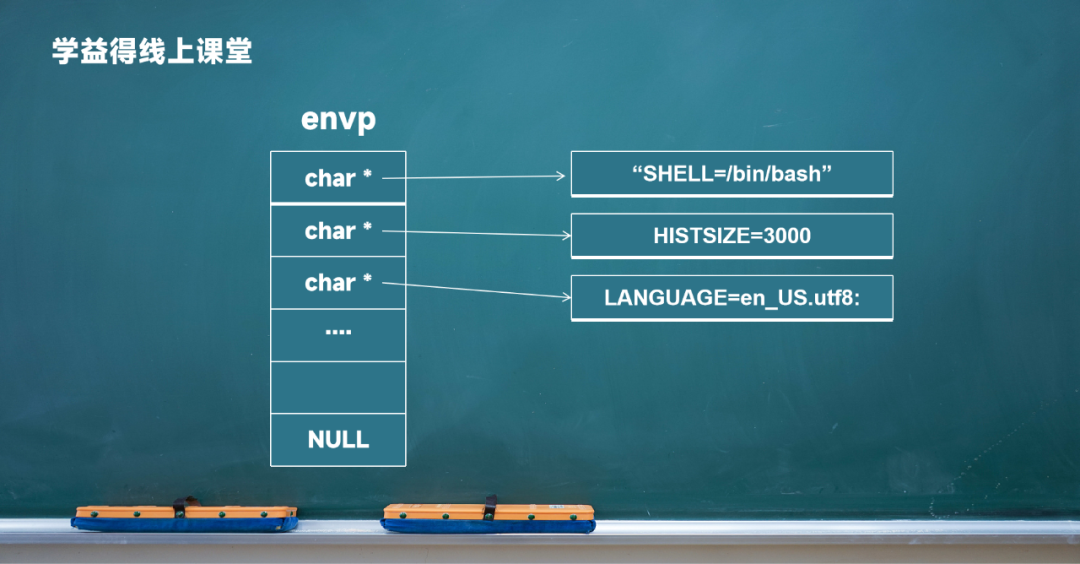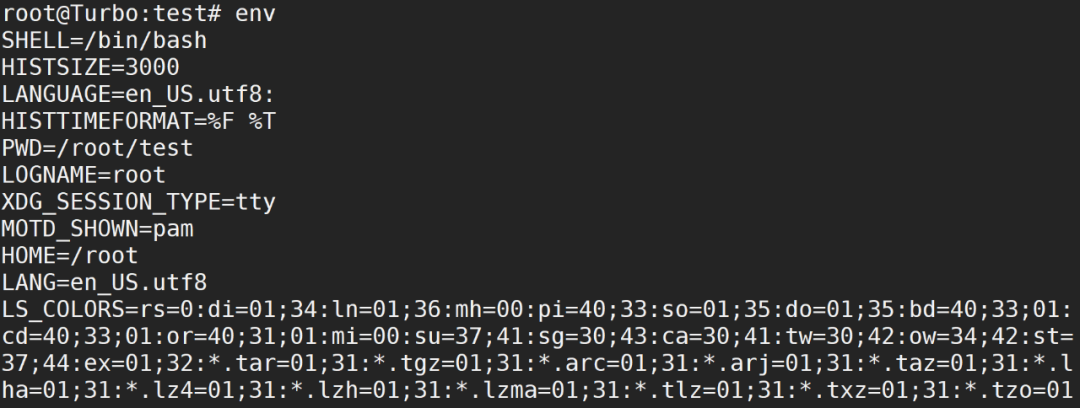

main函数的三个参数
描述
看一道海康威视的笔试题,题目很简单:
题目是多选题。
我觉得大部分同学看到这个题目的时候,应该觉得它是一个送分题。
main函数如果提供参数的话,有两个参数,一个是argc,一个是argv,其中,argc表示命令行参数的个数,argv是个指针数组,每个指针指向一个参数。
#include我们经常写这样的代码,把所有命令行参数打印出来。int main(int argc, char *argv[]) { for (int i = 0; i < argc; i++) { printf("%s ", argv[i]); } return 0; }
结果就是这样的:
root@Turbo:test# ./1 hello world ./1 hello world root@Turbo:test#但是当我们提交答案后,它居然是错的,main函数竟然有三个参数,第三个参数是envp。

这到底是个什么?
于是我找了一份glibc的源码,找到了libc_start_main函数,我们平时写的main函数,就是由它来调用的。
STATIC int
LIBC_START_MAIN (int (*main) (int, char **, char ** MAIN_AUXVEC_DECL),
int argc, char **argv,
#ifdef LIBC_START_MAIN_AUXVEC_ARG
ElfW(auxv_t) *auxvec,
#endif
__typeof (main) init,
void (*fini) (void),
void (*rtld_fini) (void), void *stack_end)
{
/* Result of the 'main' function. */
int result;
__libc_multiple_libcs = &_dl_starting_up && !_dl_starting_up;
#ifndef SHARED
_dl_relocate_static_pie ();
char **ev = &argv[argc + 1];
__environ = ev;
/* Store the lowest stack address. This is done in ld.so if this is
the code for the DSO. */
__libc_stack_end = stack_end;
# ifdef HAVE_AUX_VECTOR
/* First process the auxiliary vector since we need to find the
program header to locate an eventually present PT_TLS entry. */
# ifndef LIBC_START_MAIN_AUXVEC_ARG
ElfW(auxv_t) *auxvec;
{
char **evp = ev;
while (*evp++ != NULL)
;
auxvec = (ElfW(auxv_t) *) evp;
}
# endif
_dl_aux_init (auxvec);
if (GL(dl_phdr) == NULL)
# endif
{
/* Starting from binutils-2.23, the linker will define the
magic symbol __ehdr_start to point to our own ELF header
if it is visible in a segment that also includes the phdrs.
So we can set up _dl_phdr and _dl_phnum even without any
information from auxv. */
extern const ElfW(Ehdr) __ehdr_start
__attribute__ ((weak, visibility ("hidden")));
if (&__ehdr_start != NULL)
{
assert (__ehdr_start.e_phentsize == sizeof *GL(dl_phdr));
GL(dl_phdr) = (const void *) &__ehdr_start + __ehdr_start.e_phoff;
GL(dl_phnum) = __ehdr_start.e_phnum;
}
}
/* Initialize very early so that tunables can use it. */
__libc_init_secure ();
__tunables_init (__environ);
ARCH_INIT_CPU_FEATURES ();
/* Perform IREL{,A} relocations. */
ARCH_SETUP_IREL ();
/* The stack guard goes into the TCB, so initialize it early. */
ARCH_SETUP_TLS ();
/* In some architectures, IREL{,A} relocations happen after TLS setup in
order to let IFUNC resolvers benefit from TCB information, e.g. powerpc's
hwcap and platform fields available in the TCB. */
ARCH_APPLY_IREL ();
/* Set up the stack checker's canary. */
uintptr_t stack_chk_guard = _dl_setup_stack_chk_guard (_dl_random);
# ifdef THREAD_SET_STACK_GUARD
THREAD_SET_STACK_GUARD (stack_chk_guard);
# else
__stack_chk_guard = stack_chk_guard;
# endif
# ifdef DL_SYSDEP_OSCHECK
if (!__libc_multiple_libcs)
{
/* This needs to run to initiliaze _dl_osversion before TLS
setup might check it. */
DL_SYSDEP_OSCHECK (__libc_fatal);
}
# endif
/* Initialize libpthread if linked in. */
if (__pthread_initialize_minimal != NULL)
__pthread_initialize_minimal ();
/* Set up the pointer guard value. */
uintptr_t pointer_chk_guard = _dl_setup_pointer_guard (_dl_random,
stack_chk_guard);
# ifdef THREAD_SET_POINTER_GUARD
THREAD_SET_POINTER_GUARD (pointer_chk_guard);
# else
__pointer_chk_guard_local = pointer_chk_guard;
# endif
#endif /* !SHARED */
/* Register the destructor of the dynamic linker if there is any. */
if (__glibc_likely (rtld_fini != NULL))
__cxa_atexit ((void (*) (void *)) rtld_fini, NULL, NULL);
#ifndef SHARED
/* Call the initializer of the libc. This is only needed here if we
are compiling for the static library in which case we haven't
run the constructors in `_dl_start_user'. */
__libc_init_first (argc, argv, __environ);
/* Register the destructor of the program, if any. */
if (fini)
__cxa_atexit ((void (*) (void *)) fini, NULL, NULL);
/* Some security at this point. Prevent starting a SUID binary where
the standard file descriptors are not opened. We have to do this
only for statically linked applications since otherwise the dynamic
loader did the work already. */
if (__builtin_expect (__libc_enable_secure, 0))
__libc_check_standard_fds ();
#endif
/* Call the initializer of the program, if any. */
#ifdef SHARED
if (__builtin_expect (GLRO(dl_debug_mask) & DL_DEBUG_IMPCALLS, 0))
GLRO(dl_debug_printf) ("
initialize program: %s
", argv[0]);
#endif
if (init)
(*init) (argc, argv, __environ MAIN_AUXVEC_PARAM);
#ifdef SHARED
/* Auditing checkpoint: we have a new object. */
if (__glibc_unlikely (GLRO(dl_naudit) > 0))
{
struct audit_ifaces *afct = GLRO(dl_audit);
struct link_map *head = GL(dl_ns)[LM_ID_BASE]._ns_loaded;
for (unsigned int cnt = 0; cnt < GLRO(dl_naudit); ++cnt)
{
if (afct->preinit != NULL)
afct->preinit (&link_map_audit_state (head, cnt)->cookie);
afct = afct->next;
}
}
#endif
#ifdef SHARED
if (__glibc_unlikely (GLRO(dl_debug_mask) & DL_DEBUG_IMPCALLS))
GLRO(dl_debug_printf) ("
transferring control: %s
", argv[0]);
#endif
#ifndef SHARED
_dl_debug_initialize (0, LM_ID_BASE);
#endif
#ifdef HAVE_CLEANUP_JMP_BUF
/* Memory for the cancellation buffer. */
struct pthread_unwind_buf unwind_buf;
int not_first_call;
not_first_call = setjmp ((struct __jmp_buf_tag *) unwind_buf.cancel_jmp_buf);
if (__glibc_likely (! not_first_call))
{
struct pthread *self = THREAD_SELF;
/* Store old info. */
unwind_buf.priv.data.prev = THREAD_GETMEM (self, cleanup_jmp_buf);
unwind_buf.priv.data.cleanup = THREAD_GETMEM (self, cleanup);
/* Store the new cleanup handler info. */
THREAD_SETMEM (self, cleanup_jmp_buf, &unwind_buf);
/* Run the program. */
result = main (argc, argv, __environ MAIN_AUXVEC_PARAM);
}
else
{
/* Remove the thread-local data. */
# ifdef SHARED
PTHFCT_CALL (ptr__nptl_deallocate_tsd, ());
# else
extern void __nptl_deallocate_tsd (void) __attribute ((weak));
__nptl_deallocate_tsd ();
# endif
/* One less thread. Decrement the counter. If it is zero we
terminate the entire process. */
result = 0;
# ifdef SHARED
unsigned int *ptr = __libc_pthread_functions.ptr_nthreads;
# ifdef PTR_DEMANGLE
PTR_DEMANGLE (ptr);
# endif
# else
extern unsigned int __nptl_nthreads __attribute ((weak));
unsigned int *const ptr = &__nptl_nthreads;
# endif
if (! atomic_decrement_and_test (ptr))
/* Not much left to do but to exit the thread, not the process. */
__exit_thread ();
}
#else
/* Nothing fancy, just call the function. */
result = main (argc, argv, __environ MAIN_AUXVEC_PARAM);
#endif
exit (result);
}
果然,libc_start_main函数的第一个参数,就是待会要调用的main函数,从声明可以看出,这个函数确实有三个参数,第一个是int类型,后面两个都是char **类型。
STATIC int LIBC_START_MAIN (int (*main) (int, char **, char ** MAIN_AUXVEC_DECL),
int argc, char **argv,
ElfW(auxv_t) *auxvec,
__typeof (main) init,
void (*fini) (void),
void (*rtld_fini) (void), void *stack_end)
{
//....
}
而且程序最后调用main函数的时候,也确实是传了三个参数。
result = main (argc, argv, __environ MAIN_AUXVEC_PARAM);
第三个参数指向的是环境变量,在代码里面确实有函数对它做初始化。
envp类型和argv一样,都是指针数组,每个指针指向一个环境变量,并且最后以NULL结尾。

要是写代码的话,可以通过循环来输出各个字符串:
#include运行的结果就是这样的。跟我们用env命令看到的基本一样。int main(int argc, char *argv[], char *envp[]) { int i = 0; while (envp[i]) { printf("%s ", envp[i++]); } return 0; }

审核编辑:汤梓红
声明:本文内容及配图由入驻作者撰写或者入驻合作网站授权转载。文章观点仅代表作者本人,不代表电子发烧友网立场。文章及其配图仅供工程师学习之用,如有内容侵权或者其他违规问题,请联系本站处理。
举报投诉
-
单片机main函数在中断函数里执行?2022-10-24 1479
-
请问这两个函数的后三个参数是怎么算出来的?2019-07-01 1818
-
如何解决STM32调试无法进入main函数的问题?2018-10-05 16460
-
C语言程序的main函数免费下载2018-09-26 1221
-
main函数的末尾没有return语句会有什么影响2020-02-20 6604
-
C语言的main函数有几种写法?2020-10-15 3893
-
关于三段式充电器的三个关键参数2021-04-09 2279
-
pid控制三个参数怎么调整2021-09-19 50402
-
探究一下C语言中main函数各种不同的写法2022-08-07 1696
-
三个寄生参数对电路的影响2023-02-13 9801
-
为什么Python没有main函数?2023-08-17 690
-
range里面三个参数的含义2023-11-21 12799
-
c语言源程序main函数的位置2023-11-24 4057
-
sumif函数三个条件怎么填2023-11-30 7881
-
if函数三个条件怎么填2023-12-03 4882
全部0条评论

快来发表一下你的评论吧 !

